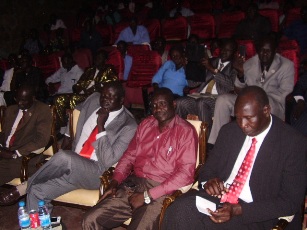Aweil parliament rejects household taxes over people’s hunger
May 5, 2016 (JUBA) – Members of parliament in the newly created Aweil state (Northern Bhar el Ghazal) have rejected a proposal by the state minister of finance seeking to raise household taxes from natives of the area, despite many struggling to make a living on daily basis.

However, with people being unable to make a living for themselves, it puts to question how the authorities would sustain their operations and how it would achieve the objective for which the new administrative units were created.
In most areas of Bahr el Ghazal region, and particularly areas adjacent to neigbouring Sudan, civilians due to hunger and insecurity have massively crossed into Sudan where they have been put into concentration camps as refugees and fed by humanitarian organizations.
Speaking in an interview with Sudan Tribune from Aweil town on Thursday, the head of parliamentary affairs committee responsible for information, Benson Opuothmalo, said the decision of the parliament to suspend taxing civilians was born out of the fact that the citizens would not pay because of hunger.
“The decision of the house was made in recognition of the situation facing our people. This year is a very bad year. The citizens are struggling to make a living. If it were a good year, the house of course would have examined the proposal to see how the areas and projects requiring funding through local revenues would be used and how much was required,” said Opuothmalo.
“But because this is a bad year, we told the minister of finance to suspend and leave the house collections until the situation improved. When the situation improved the house collections will resume. This was only what we have done in the assembly,” he further explained.
Aweil state is one of the controversial 28 states which came into existence as a result of presidential order creating more administrative units despite signing the peace agreement on the basis of 10 states.
The new state was curved out of five counties, some of which became states of their own. Others were merged with counties from other states to form another state in fulfilment of presidential establishment.
Aweil state is formed out of an amalgamation of Aweil south, Centre and areas around Aweil town, the capital of the new state.
The counties of Aweil West and North have been merged with Raja which was a county under Western Bahr el Ghazal state to form a new Lol state.
Aweil East, which was one of the five counties forming the defunct Northern Bahr el Ghazal state, became a state of its own.
The new states are yet to receive a budget and have continued to operate on a shared budget previously meant for 10 states, making it difficult to provide services to the people.
Finance State Minister, Garang Majak, welcomed the decision of the house but further argued that the government has the right to raise taxes from household to provide basic services to the people.
Majority of the 28 states have no budget and the newly appointed governors and their commissioners have been asking the citizens, also seen poor, to contribute to the new governments so that they buy vehicles for officials as well as cater for other operational necessities.
(ST)
